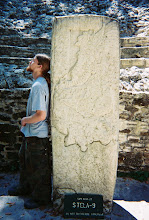
Ode to Indian Classical Music
Sometimes you do need a fundamental understanding of differential equations to understand these rhythms, sometimes you need to make sure that every atom from that sound wave hits your ear drum to absorb the precision in every delicate bend of that sitar string. Sometimes you need GPS, an atomic clock and tour guide to know where you are in the musical piece, because while the westerner counts his beats saying:
1...2...3...4...
2...2...3...4...
The Indian Classical Musician counts his beats saying:
Ti ka ti ka ta ka ti ka
Ti ka ti ka ta ka ti ka
Ti ka ti ka ti ka ti ka ti ka ti ka ta ka ti ka
da ti da kin ta
da ti ka
da ka
ti ka ti ka ti ka ti ka ti ka ti ka
da ti da kin ta
da da ti ka
da da ti ka ta
ti ka ti ka tin ta
da da ti kat
da da ti kat
da ka
Sometimes you can't blink because this musician is building an interactive and colourfully ornamented curvilinear architectural masterpiece of a building for you and he needs your help. Because if you, the bricklaying listener aren't paying attention and you miss one brick, you won't be able to comprehend the majestic building that is standing before you.
Sometimes you need to do more than blink, you need to just shhhhhh.... close your eyes, sit back, relax and please just take it all in.
This is not listening to a piano concerto where you're going up and down many teeny tiny little stair steps.
This is not listening to power chord grunge rock where you're hopping over giant rectilinear boulders.
This is not Hip Hop where you're jumping over walls of drum machine constructed 4-4 beats.
This is Indian Classical Music, where during Alap, the slow arrhythmic part, you are a jelly fish drifting through the ocean curling in and out of yourself riding the dancing curtains of sunlight.
Then during Jor, the rhythmic but still slithery dominant melody glides you on as the tabla comes in. These two percussive extensions of feeling make melodies of their own as you become an octopus, with your tentacles meandering intricately in eight directions at once but still propelled by the unison of the arms rhythmically propelling you forward.
You then rise to the surface during the Jhala part of the piece when the rhythm overtakes the melody and you undergo metamorphosis again to become a butterfly fish dancing over and under the waves of the taal, the mathematical spirals of improvisation that can go from three to 108 beat cycles. They ebb and flow through the fingers that dance and wrist that slides on the skin of the drum.
The fins and gills of the listener mature as you transform into a salmon finding that river and racing up the rapids during the drut, the rising and rising and rising action, the demanding conclusion that can accelerate up to 320 beats per minute. The fingers are moving so fast they are invisible, the performers and audience are concentrating so hard that an asteroid flying through the roof of the venue would just half to wait because these musicians are giving every cell of blood to this expression. They are hyperventilating to give your out of body experience a little for the road.
It all ends with the Tihai, the polyrhythmic and surgically culminated finale. The salmon has gone through 3 billion years of evolution in one and a half hours after traveling thousands of miles for that sitar and tabla multiple orgasm in the breeding waters high in the mountains. The glossy eyes overlook the treacherous journey that soothed, stimulated and invigorated to end in the numbing comfort that comes from the instantaneous release of a lifetime of earned tension.
And that's just the first song.





